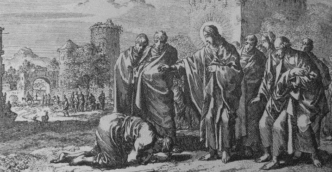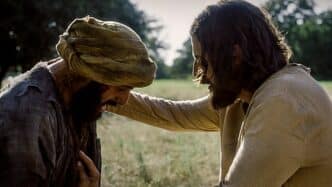Have you seen Lazarus lately?
If we think “Well, no, not really,” maybe we need to think again. The profoundly important message of this Sunday’s readings is that Lazarus may be closer than we realize — and we need to look for him and, above all, seek to help the helpless.
Last week, you’ll remember, Jesus warned his disciples that you can’t serve two masters, and he put it simply: “You cannot serve God and mammon.”
This week, he ups the ante, with a parable about an astoundingly rich man who ignores the gnawing poverty right outside his front door. The fate of the rich man and the fate of the poor beggar Lazarus tell us all we need to know. The lesson is clear: We need to share what we can with those struggling with the hard reality of life.
We can’t shrug off or easily dismiss the urgent commandment to love one another — particularly when it comes to the poor.
Inheriting the next world
But that’s just the beginning. This Gospel carries even more weight than we may realize.
| September 28, 2025 – Twenty-sixth Sunday in Ordinary Time |
|---|
| Amos 6:1a, 4-7 Ps 146:7, 8-9, 9-10 1 Tm 6:11-16 Lk 16:19-31 |
First, there’s context. In Luke’s gospel, it is one of several stories that Jesus told his apostles as he was making his way to Jerusalem, where he was destined to suffer and die. We’ve been hearing these parables for the last few weeks. They matter. Greatly.
Given when they occur in the life of Christ, they take on added urgency. These are the last lessons he would share before his passion — and these are the things he wants us to remember above all else. You might consider them his last testament.
They are fundamental lessons of selflessness and sacrifice that go to the heart of his earthly ministry.
They warn us that you cannot love God and money.
They remind us that we are all prodigals, and that God’s mercy endures forever.
They exhort us that we need to turn our backs on the things of this world if we want to inherit the next.
And they challenge us with the sobering fact that we can’t ignore the poor outside our door.
What have we failed to do?
That brings us to the second point to remember. Sometimes the most serious sin we can commit is a sin of omission.
The rich man is damned not for what he did, but for what he didn’t do. He continually saw Lazarus suffering and did nothing. This was his most serious sin.
We can’t help but ask ourselves: Is it also ours?
Do we see a need and ignore it? Do we see a problem and step over it? Do we see heartbreak and desperation, and then do nothing to alleviate it? Do we hear the cries of the poor and put our hands over our ears?
Do we fail to see in our suffering brothers and sisters the face of Christ? Whenever we pray the confiteor at Mass, the “I Confess,” we ask mercy for “what I have done and what I have failed to do.”
This Gospel makes us ask the hard question: What have we failed to do?
The scriptures this Sunday are collectively a cry against indifference –“Woe to the complacent!,” as the first reading puts it.
A little examination of conscience is called for. We need to shake off whatever complacency has taken over our lives. Pay attention. Seek solutions. Reach out a hand. Stop making excuses, avoiding, stepping over, looking away.
Whether we want to acknowledge them or not, the world is crowded with Lazaruses.
And this Gospel makes this much clear: at the end of our lives, we will be judged not only on what we do, but on what we have failed to do.







